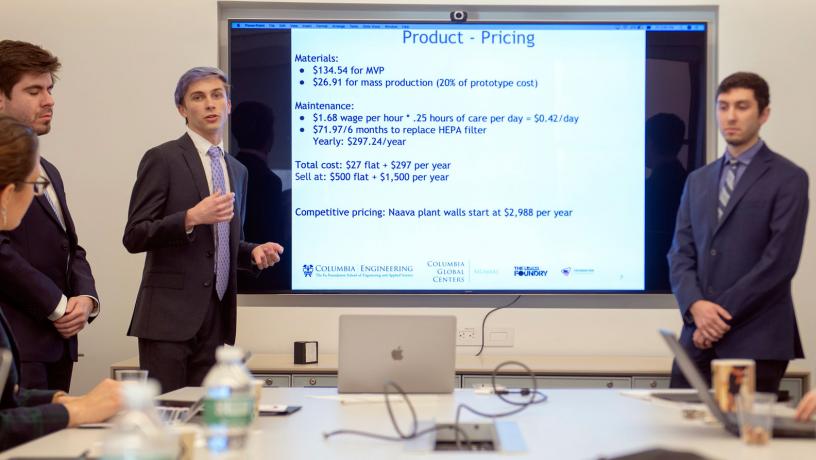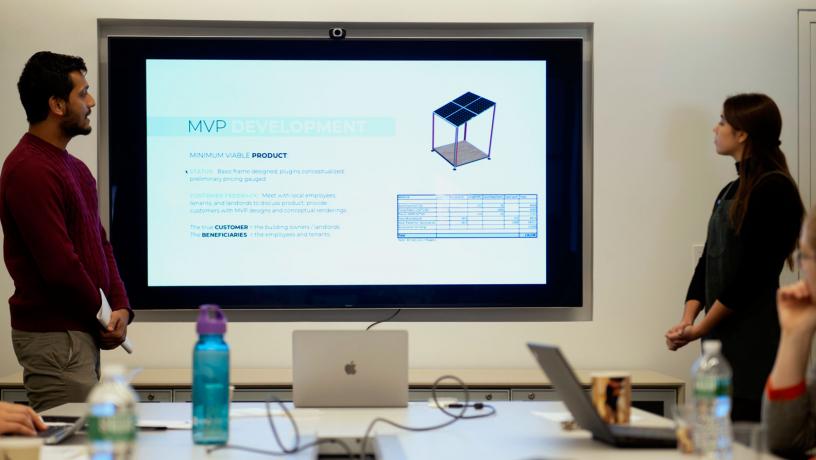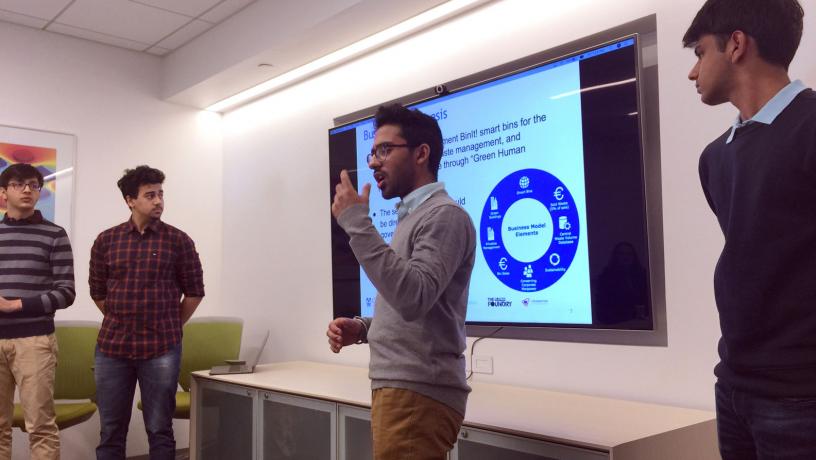Next Stop: Mumbai
Student entrepreneurs take a client discovery journey to India
Three teams of Columbia student innovators will jet off to Mumbai in January for ten days of workshops, site visits, client discovery, and sessions with Indian colleagues. Armed with promising proposals for developing more sustainable work spaces, the students are finalists in Columbia Engineering’s Urban Works Innovation Challenge 2018.
The three teams were selected from a field of eight groups who competed on December 7 for the all-expenses-paid trip. The event marked the culmination of a multistage design process that began in October, when Columbia Engineering faculty Patricia Culligan, Ioannis Kymissis, V. Faye McNeill, and Vijay Modi—as well as leaders from the University’s Global Center in Mumbai—held an open orientation. The initiative is geared at generating creative thinking—and practical startups—for how India can simultaneously accommodate its rapidly expanding workforce, minimize pollution, and protect the environment.
The winning ideas included means for improving air filtration, readily increasing usable work space, automatically sorting trash, and recycling textile waste.

From left, Daniel Solis '19, Andrew Countryman '19, and Rosario Giufre '19SIPA presenting Mossy: The Modular Tower.
Mossy: The Modular Tower—developed by Samuel Castro ’19, Andrew Countryman ’19, Rosario Giufre ’19SIPA, and Daniel Solis ’19—is a customizable system that couples both conventional HEPA filters and hardy natural moss to clean and humidify indoor air. Made up of adaptable cubes that can be arranged for particular spaces and needs, the design also includes misting components for the moss and a variety of sensors for measuring humidity, air quality, and when filters should be replaced.
“Researching mechanical methods of addressing air pollution, we decided to figure out if natural methods such as moss could be implemented as a more sustainable alternative,” Solis said. “We played around with different iterations, ranging from a window-like installation to a green roof dome, and eventually ended up with a modular design that could fit anywhere in office space and allow for various components.”

Sidharth Somana '19GSAPP (left) and Andrea Partenio '19GSAPP (right) presenting from Modular Work Spaces.
Modular Work Spaces—the brainchild of Hector Castillo ’19GSAPP, Regina Gonzalez ’19GSAPP, Andrea Partenio ’19GSAPP, and Sidharth Somana ’19GSAPP—powers fully functioning outdoor structures with roof-mounted solar panels. The easy-to-assemble pop-ups are designed to supplement limited space in dense urban areas by allowing workers to occupy places like roofs, terraces, and courtyards.
“We were looking for opportunities to create value beyond enclosed office space,” Somana said. “After some iterating, we imagined a totally modular kit of parts that would allow not only for an eight foot by eight foot space but for a number of configurations that offer a kind of shared outdoor amenities space for tenants of buildings.”

From left Ishaan Chandratreya '22, Ketan Jog '22, Ajit Akole '22, and Raghav Mecheri '22 presenting BinIt.
Rounding out the top three is BinIt. Created by first-years Ajit Akole ’22, James Bollas ’22, Ishaan Chandratreya ’22, Ketan Jog ’22, and Raghav Mecheri ’22, this smart trashcan uses computer vision and a robotic arm to automatically sort refuse into different categories. The device will enable companies to monetize waste, helping make sustainable practices profitable.
“We came up with using a trashcan to auto-segregate trash at the point of disposal, and the idea grew from there,” Mecheri said. “We envision building them to be 20 to 30 gallons in volume, just slightly larger than the plastic color-coded trashcans you see around campus, and selling them at just $19.99 per unit.”
In Mumbai, the teams are excited to take advantage of their packed itinerary to explore market needs, connect with potential clients and partners, and even begin testing prototypes.
“Our whole team is going,” Solis said. “We hope to meet with various stakeholders, ranging from office space managers to interior designers to suppliers for Mossy’s core components, to gain insight into questions of what designs are most desirable and what features will generate the most interest in purchasing our product.”
“Two of us are going to be in Mumbai over winter break anyway, as we live there, and the other three will make the trip down,” Mecheri said. “We’re aiming to get some market research done, speak to some experts in waste management—especially with respect to Asia—and also explore the possibility of alpha-testing our prototypes at a few corporate campuses.”
The Urban Works Innovation Challenge marks the latest in an array of design challenges headed up by Columbia Engineering that have fostered solutions for problems including Ebola and urban pollution. It is part of a new partnership between Columbia Engineering and the Columbia Global Center in Mumbai along with CoWrks, a local acceleration program for young businesses in areas like urban tech and social entrepreneurship, and the RMZ Foundation, a major philanthropic organization contributing to a more sustainable and equitable India. The trip to India represents the first initiative in a projected three years of convening engineering, planning, public health, business, and policy experts to collaborate on improving the country’s workspaces.
In the spring, after further R&D, the winning Columbia team will earn another trip to spend two weeks at the CoWrks Foundry in Bangalore working to turn their product into a viable startup.
“From teaching ourselves design software to seeing how business plans are as much about carving out a niche as reaching large volumes of people, we’ve learned more in the last few months than we could have possibly imagined,” Mecheri said.
